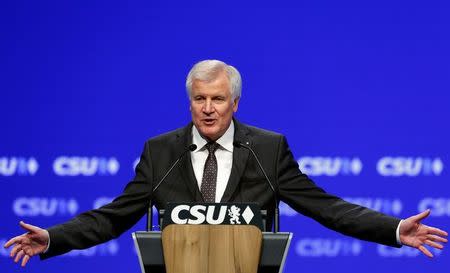Germany's CSU edges toward rapprochement with Merkel's CDU
By Andreas Rinke BERLIN (Reuters) - Bavaria's Christian Social Union (CSU) on Saturday agreed to focus on common interests with Chancellor Angela Merkel's Christian Democrats (CDU) ahead of national polls next year, edging away from differences over immigration that have divided the sister parties. "Our opponent is not the CDU," CSU leader and Bavarian state premier Horst Seehofer said on Saturday, warning a party congress that the CSU needed a conservative victory in September 2017 national elections to ensure its success in a 2018 state vote. In a gesture aimed at smoothing over differences between the sister parties, Seehofer on Friday said he was wrong to openly criticize Merkel for her refusal to adopt limits on refugees, although he insisted that he still wanted annual numbers of migrants capped at 200,000. The parties also remain at odds over national referendums - a move backed by the CSU but rejected by Merkel and the CDU. The dispute over migration caps has hurt both parties in opinion polls and contributed to a series of state election defeats, with many voters shifting away from the conservatives to the anti-immigration Alternative for Germany (AfD). A recent poll by German broadcaster SAT.1 Bayern showed nine percent of Bavarians now support the AfD, with the CSU losing its absolute majority and pulling in just 44 percent. The CSU is sister party to Merkel's Christian Democrats (CDU), and together they form "The Union". But angst in the fiercely proud and traditional CSU about last year's influx of almost a million migrants has sown discord between the allies. Merkel, expected to seek a fourth term next year, rejects a cap on migrants, but she needs the support of the CSU, which operates only in Bavaria and delivers about a sixth of the combined CDU/CSU vote. A large majority of party members voted against a motion that would have forced the CSU to refrain from supporting Merkel as the conservative candidate for chancellor, after Seehofer said it was critical to first debate substantive issues with the CDU before addressing personnel matters. Party members also approved a proposal to fight against a future national coalition of left-leaning parties, including the far-left Left party, the centrist-left Social Democrats (SPD), and the pro-environment Green party. Currently, the German government is run by a coalition of the conservatives and the SPD, but growing divisions have prompted speculation that left-leaning parties could join forces to run the government after next year's parliamentary elections. Seehofer, in an apparent bid to win back voters drifting toward the AfD, said the CSU was center-right oriented, but also wanted to offer a political "homeland" for "national conservatives" and those with traditional values. Party members also approved a new program entitled "The Order", which embraces German "Leitkultur" or "leading culture" and maps out specific security and economic policies. In an apparent reference to the AfD, Markus Blume, who headed the commission that drafted the document, said the plan was aimed at differentiating the CSU from other parties that "divided and only played with people's fears." (Reporting by Andreas Rinke,; Writing by Andrea Shalal,; Editing by Stephen Powell)

 Yahoo News
Yahoo News 

